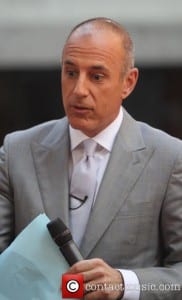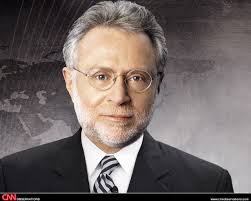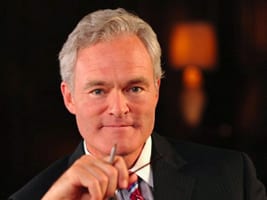From our archives—
Patrice Greanville (First posted 9/1/07)

CBS top honcho Les Moonves (net worth $300MM) and Katie Couric (net worth: 60MM). Moonves currently makes $70MM a year. Both are leading members of the nation’s glitzy “media bourgeoisie.”
There’s a widespread assumption in leftwing circles that increasing concentration of media ownership is, ipso facto, the main if not sole culprit for the appalling state of mainstream journalism in our time. Surely there’s a lot to decry, but is media consolidation and deregulation the cause for this calamity? And if the American media have indeed fallen from grace, as it is claimed, where in time do we locate this mythical “golden period” when the media establishment did measure up to its social mandate?
That the American media are palpably in what we might call today a pathetic and degenerate state, if not a free fall toward irrelevancy, should be obvious to thoughtful observers. This reflects the larger forces at work: As US capitalist democracy and general culture evolve due to their inexorable dynamic into ever more predatory and cynical iterations (Bush is more a symptom of the disease than its cause), so do the “relative” quality of the nation’s formal institutions, whether they be at the political center or adjunct, such as the media. But I think that attributing the obscenely bad performance of the corporate media—and television in particular—to concentration is somewhat erroneous. I realize this is by now, mainly thanks to the work of Ben Bagdikian and others, an article of faith on the liberal left. The usual mantra is “It’s the media concentration, stupid!”. But in order for me to believe that claim, that a few decades ago, when diversity of ownership was more widespread than now, everything was honkey dorey in Ed Murrow heaven, you’d have to show me first a period when the American media was substantively better than today, and that, friends, is hard to do, no matter how many media icons you roll out to worship.
[pullquote]We regularly rerun articles of compelling and lasting interest. We wish the truths told in such articles had become obsolete, had been retired by social change and good leadership. Unfortunately that rarely happens. This is one of such essays.
[/pullquote]Hard if you take the historical record as the arbiter of truth and not the intramural chatter of the profession, which far too many critics seem to have swallowed without examining its self-serving distortions. For at all times the performance of a mass media system must be measured and graded according to output, and this output has been consistently deplorable, for at least 150 years, and shamefully so since the era of supposedly “professional journalism” began in the 1920s. Shall we review this for a moment? (I’m speaking here of mass media, not about the dissenters’ publications, which America has always had.) The question we must ask is: when confronted with severe crises of democracy and criminality in foreign policy, what did the press do?
Consider a few turning points in American history. Let’s take first the infamous “Palmer Raids” in the first quarter of the 20th century. In the wake of the birth of the Soviet Union and the disaster of the First World War, a great upsurge in worker agitation ensued which struck fear in the heart of many ruling classes around the world. The response of the US ruling class, always paranoid to a fault, was swift and unsurprising. As is customary, the target was the “radical movement” and its alleged threat “to the nation” (i.e., big propertied interests). In an article in Forum magazine in February 1920, aptly entitled “The Case Against the Reds,” Attorney General A. Mitchell Palmer held forth in near-Apocalyptic terms:
“Like a prairie fire the blaze of revolution was sweeping over every American institution of law and order…It was eating its way into the homes of the American workman, its sharp tongues of revolutionary heat were licking the altars of the churches, leaping into the belfry of the school bell, crawling into the sacred corners of American homes seeking to replace marriage vows with libertine laws, burning up the foundations of society.”
Under Palmer’s direction, and the direct supervision of J.Edgar Hoover, one of the most sordid hypocrites in American history, waves of spies, paid informers, and agent provocateurs were sent into unions, self-help organizations for the foreign born, and leftist groups of many stripes. A special Justice Department publicity bureau was commissioned to concoct and dissseminate stories around the country about a Moscow-directed plot to overthrow the government in Washington. As James Aronson has noted in his classic The Press and the Cold War, press releases were issued daily with inflammatory and highly tendentious headlines, such as, “US Attorney General Warns Nation Against Bolshevik Menace.” Inevitably, once the “radical enemy” had been properly softened through character assasination (a favorite trick), the government’s henchmen moved in to finish the job. On November 7, 1919, as a dress rehearsal, hundreds of foreign-born citizens were arrested throughout the country, many at meetings commemorating the second anniversary of the Russian Revolution. A few months later, on January 2, 1920, raids were carried out in 20 cities with the assistance of state and local police. More than 1,000 were arrested just in New York City, and 400 in Boston, where, as Aronson again notes, the prisoners were marched in chains through the streets. Similar scenes were recorded in many other cities, factories, and communities.
[pullquote] In the US all top journalists and media figures, and most certainly top executives and media owners, are multi-millionaires (many, like Oprah, billionaires). Living a privileged, insular existence, they can hardly imagine the world through a lens conducive to sympathising with the travails of ordinary folk. [/pullquote]Now, this was a blatant unconstitutional abuse of power, for if freedom of speech and political assembly are worthless when you side with an “unpopular” viewpoint or vision, what is the meaning of protected freedom? We don’t need protection or guarantees when we’re safely ensconced in the bosom of the majority opinion, or fully compliant with the approved status quo. Anyone can loudly proclaim his love for apple pie and motherhood and expect zero retribution for such “bravery” in America. So, how did the media behave? This much more owner-diversified media? Did we see furious editorials and scrupulous coverage denouncing such obvious government overreach?
Well, not exactly. Emblematic of the media’s attitude, on January 3, the day after the raids, The New York Times reported the roundup of “2,000 Reds” putatively involved in a “a vast working plot to overthrow the government.” The headline read:
“REDS PLOTTED COUNTRY-WIDE STRIKE–ARRESTS EXCEED 5,000–2,635 HELD.”
By the way, in case you never thought about it, “Reds” is an invidious term calculated to dehumanize radical activists.
On January 5, the American press’ “paper of record” let loose with an even more overt endorsement of the persecution:
An editorial in Editor & Publisher, the newspaper industry trade journal, later summed up the situation rather neatly:
So much for the press’ “superior” performance nine decades ago. Did anything really change since then? Let’s look at the “output”— again.
• Did the press stop “Tailgunner” Joe McCarthy in his tracks when the Republican senator started pulling rabbits out of his hat, which the media, along with many other powerful opinion forming institutions, could have easily done? Nope. He practically had to self-destruct by hubristic overreach before the puppeteers upstairs decided he’d become a liability and threw the switch to cancel his show (mostly because, in search of more headlines and power, the opportunistic senator had begun to insinuate that the Army was crawling with Reds). With a real quality press McCarthy and the whole stinking anticommunist hysteria of the 1950s would not have happened.
• Did the press stand in the way of the “forgotten war,” our cynical imperial war in Korea? Nossirreee. With a real quality press Korea would not have happened.
• Did the press denounce our subversion of legitimate governments and stealthy interventions in the political processes of Iran, Guatemala, Greece and even Italy in the 1940s and early 50s? In Italy and throughout Europe we even left behind an extensive anti-communist terrorist secret network of agents and provocateurs ready to spring to action in any country that tilted too much to the left in the eyes of the Washington overlords (see Operation Gladio). With a real quality press these outrages for which we are still paying would not have happened.
• In the 60s and 70s, did the press stop our cynical and even more murderous imperial war in Vietnam and the rest of Indochina? Did it expose its off-the-charts hypocrisy and immorality? No again. Did the press ever clarify what was really going on in Latin America, notably in Chile (where a democratically elected president was toppled and murdered in 1973), Argentina (where a massive dirty war, from 1975 onward, coordinated with US assistance, took tens of thousands of lives), what the situation really was in Bolivia, Colombia, Uruguay, Brazil, Nicaragua, and El Salvador, to mention just the more notorious examples of criminal meddling by the CIA and US military? And did the press lift a finger to defend or explain the Cuban revolution instead of demonizing it, a practice that remains alive and well to this day? With a real quality press Vietnam and the rest of those crimes would not have happened. (Let’s recall this was the “golden years” of TV journalism, with names such as Murrow, Cronkite and similar press heroes emblazoned on the profession’s escutcheon.)
• In the same postwar period did the press expose—on its own— the shameless and criminal abuses of the great industrial monopolies, drugs, cars, food, etc? No. It took a crusading populist Senator from (of all places) Tennessee (Estes Kefauver) to conduct revealing hearings on these oligopolies (the story was quickly swept aside), and the work of an outsider to the media, Ralph Nader, to blow the whistle on the automotive cartel’s deliberate underperformance.
In more recent times, why didn’t this supposedly “liberal” media stop Ronald Reagan, a man whose political resume reeked with willful prostitution to the plutocracy? Let’s recall that it was the Reagan regime that inaugurated the radical right’s ascension to power, with a cast of necocon malefactors soon to find continued employment in the two Bushes’ administrations—and whose handiwork require no further comment on this blog.
The media did not perform its basic duties in the 1920s, nor in the 1950s, nor in the 1960s, 70s, 80s, 90s, or since the turn of the new century. Yet in earlier years there was far less media ownership concentration. So where is the significant correlation between quality and concentration? Where is this wonderful past, this period when the American press was behaving according to its own glowing mythical best?

Controversial Jill Abramson, new NYT’s Exec Editor, succeeding Blll Keller. Compensation unknown, but net worth estimated in the millions.
Matters of degree you may say, and I’m not saying that some differences, however small, may not have important consequences in a monster nation of this size and power. One or two degrees of difference may spell life or death for hundreds of thousands or even millions of humans, animals, and other species. True enough. (The same logic applies to differentiate between Democrats and Republicans, for those who like to study quantum particles.) But that’s a different discussion, related to quantitative aspects of social institutions, not qualitative aspects. Perhaps the lesson of this cursory review of the American media record is that many people continue to confuse “numerosity” with true diversity. But as is the case with fractals, you can split an entity into innumerable pieces, and, as long as those pieces carry the same “DNA”, they will stubbornly replicate the same marching values.
We see this in media and we see this in any other industry or institution of the capitalist matrix we inhabit. In 1911 the Feds split Standard Oil, thinking that size was the culprit. It was as effective as King Canute ordering the waves to recede—do we have real competition today? How do you think we are being treated by the oil companies? The breakup of AT&T was initiated in 1974 by an U.S. Department of Justice antitrust suit against the telephone monopoly. Under the terms of a settlement finalized on January 8, 1982, “Ma Bell” agreed to divest its local exchange service operating companies, in return for a chance to go into the computer business, AT&T Computer Systems. Effective January 1, 1984, AT&T’s local operations were split into seven independent Regional Holding Companies, also known as Regional Bell Operating Companies (RBOCs), or “Baby Bells”. Did the public really get better service out of this, especially after de facto deregulation? Not really, because monopolies—and even subparts of a huge monopoly are grotesquely large entities—do not really compete, except in superficial matters. True price and quality wars are the exception, not the rule.
Sociology rules: It’s a class question, chump
Since the overwhelming majority of the corporate media—big or small—is perforce beholden to capitalist values and goals, then it’s the resulting sociology of the profession that trumps matters of simple size. As media critic Robert McChesney has pointed out in his intro to Danny Schechter’s classic, The More You Watch, the Less You Know, words that should be taken to heart by J-school students (and faculty):
One of the important functions of the profession of journalism is to make journalists and the public regard issues of ownership and control as unimportant to explaining how the media operate.
And McChesney goes on to elaborate,
[P]rofessional journalism was born almost a century ago precisely during the era that newspaper ownership was consolidating and advertising was becoming the primary means of support. Urged on by the largest publishers, professional journalism was supposed to assure readers that the news could not be influenced by owners or advertisers or the biases of the journalists themselves.
Noble intent, indeed, but what happened? What always happens: the logic of business, the irrepressible dynamic of the economy that owns all and controls all, soon blew away anything exogenous or inimical to the goals of the company or business in general, and in passing created a tacit set of workplace rules that no ambitious journalist concerned about his or her career was bound to disregard for long–or ever. As Ben Bagdikian himself has noted,
…professional journalism internalized the overall political values of the owners and advertisers (nearly identical, anyway), and recognized a decontextualized “neutral” coverage based upon “official sources” as legitimate news.
The “commoditization” of journalists
A commodity is anything that is bought and sold on the market with the sole purpose of making a profit. And when journalists literally sell themselves to their employers, and consciously do their bidding, they commoditize themselves just like any other item, except that the respectable operating phrase here is “pursuing a career.”
Careerism — which is another word for putting self-interest over the public interest—trumps duty every day in America. It’s the “natural” and rarely questioned American script, all the way from the halls of Congress to the nation’s newsrooms. This is not an admirable value among common citizens, but among people entrusted with the well-being of the commwealth, it is nothing short of poisonous. And we see the fruits of this shabby “ethic” everywhere in our social disintegration. For journalists—and media workers in general—are no more exempt from duty to the society they have freely chosen to serve than judges, police, firemen, doctors, emergency room personnel and other critical services professions.
This wholesale corruption of duty in what is arguably one of the most important professions in a free society—to serve as the [educated] eyes of the people in their democratic decisionmaking—is abetted by institutional arrangements and “examples” that easily misguide the young and confuse the citizenry. For the undeniable fact is that, as befits a huge, extremely rich, and complex nation ruled by the market, we have given rise to journalism schools that crank out new media personnel already fully acclimated to the political requirements of the system, and see nothing wrong in cutthroat competition to advance their own personal agendas. Enormous salaries comparable to the obscene pay of professional athletes constitute the lure for perdition. (Katie Couric got a $60 million contract to anchor for CBS, and other stars and “celebrity media people” command similarly stratospheric compensation) are now the rule in the profession’s “pinnacle” —which of course includes the perennially “invisible” top media executives. Are we to expect an understanding or even true sympathy for the travails of the average working stiff from a crowd so alarmingly insulated from their reality? Certainly not. After all, as the old Bolshies used to say, existence conditions consciousness, and not the other way around.
In conclusion, as it relates to overall performance, while concentration in traditional media may matter somewhat by raising still more the “barriers to entry” and stifling the appearance of alternative outlets, it is really secondary to the longstanding and deeply embedded political and social “DNA” of the American press, dominated by a decadent capitalist worldview and an utterly bourgeois way of interpreting events that effectively prevents it from fulfilling its mandate. Someone who certainly knew what the profession was all about had this to say, long ago:
“There is no such thing, at this date of the world’s history, in America, as an independent press. You know it and I know it. There is not one of you who dares to write your honest opinions, and if you did, you know beforehand that it would never appear in print. I am paid weekly for keeping my honest opinion out of the paper I am connected with. Others of you are paid similar salaries for similar things, and any of you who would be so foolish as to write honest opinions to appear in one issue of my paper, before twenty-four hours my occupation would be gone. The business of journalists is to destroy the truth; to lie outright; to pervert; to vilify; to fawn at the feet of mammon, and to sell his country and his race for his daily bread. You know it and I know it and what folly is this toasting an independent press? We are the tools and vassals of rich men behind the scenes. We are the jumping jacks, they pull the strings and we dance. Our talents, our possibilities and our lives are all the property of other men. We are intellectual prostitutes”—– John Swinton, former Chief of Staff, The New York Times, circa 1880
If anyone can locate the age of American golden journalism, please drop me a line.
ABOUT THE AUTHOR
Patrice Greanville is The Greanville Post‘s founder and editor in chief.
Note: All net worth figures mentioned in this article are estimates, collated from various sources, including Forbes, Fortune and others.









